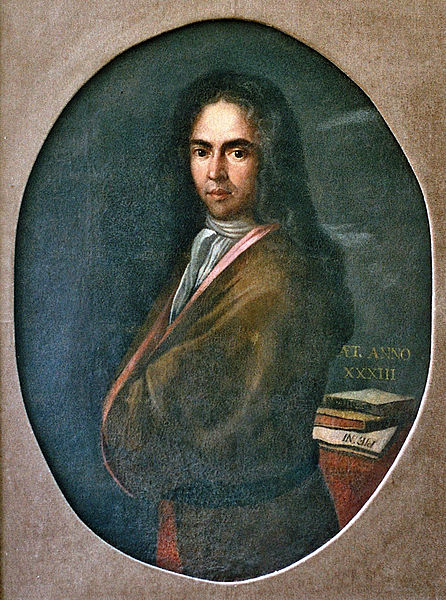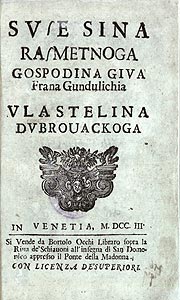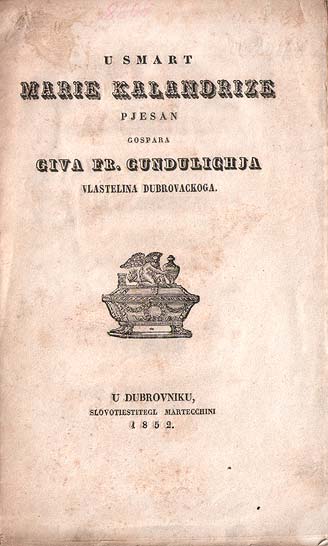<Back to Index>
- Physicist Walther Wilhelm Georg Bothe, 1891
- Poet Ivan (Dživo) Franov Gundulić, 1589
- Chairman of the Council of Ministers Georgy Maximilianovich Malenkov, 1902
PAGE SPONSOR



Ivan (Dživo) Franov Gundulić (also Gianfrancesco Gondola; 8 January 1589 - 8 December 1638; Nickname: Mačica) is the most celebrated Croatian Baroque poet from the Republic of Ragusa. His work embodies central characteristics of Roman Catholic Counter - Reformation: religious fervor, insistence on "vanity of this world" and zeal in opposition to "infidels." Gundulić's major works — the epic poem Osman, the pastoral play Dubravka, and the religious poem Tears of the Prodigal Son (Croatian: Suze sina razmetnoga; based on the Parable of the Prodigal Son) are examples of Baroque stylistic richness and, frequently, rhetorical excess.
Ivan Gundulić was born in Dubrovnik in a wealthy Ragusan noble family (House of Gundulić) in 8 January 1589. Son of Francesco di Francesco Gundulić (senator and diplomat, once the Ragusan envoy to Constantinople and councillor of the republic to the Pope Gregory VIII) and Djiva Gradic (de Gradi). He received an excellent education. He probably studied the humanities with the Jesuit Silvestro Muzio and philosophy with Ridolfo Ricasoli and Camillo Camilli (*Siena -+1615), who in late 1590 had been appointed rettore delle scuole e professore di umane lettere in Ragusa. After that he studied Roman law and jurisprudence in general, where he held numerous offices for the Great Council of the Republic. In 1608, when he was nineteen, he became a member of the Veliko vijece (Great Council). Twice, in 1615 and 1619, he held the temporary function of knez (commissary or governor) of Konavle, an area southeast of the city.
At the age of thirty he married Nicoleta Sorkočević (Sorgo) (+1644) who bore him three sons, Frano (Francesco), Mato (Matheo), Šiško (Segismondo) and two daughters, Maria (Mara) Gondola and Dziva (Giovanna). Fran Dživo Gundulić and Mato Gundulić (1636 – 1684) fought in the thirty - years war under Wallenstein; the youngest died on January 16, 1682, and was by then the Rector of the Republic.
From 1621 until his death Gundulić held various offices in the city government. In 1636 he became a senator, in 1637 a judge, and in 1638 a member of the Small Council (Malo vijeće). Ir s believed that had he lived a little longer - he died of an intense fever, product of an inflammation in his ribs - he would probably have been elected knez of the Dubrovnik Republic, the highest function that was held for one month only by meritorious gentlemen at least fifty years old. His father, who died in 1624, had been knez five times, and Gundulić's son Šišmundo Gundulić later four times. He began his literary career by writing poems and staging melodramas that became popular in Dubrovnik. But Ivan published only his larger works. His earlier work, which he referred to as a "brood of darkness", is now lost. His first publications were in 1621, when he rewrote several of David's Psalms and wrote several religious poems. He then wrote his famous Suze sina razmetnoga (Tears of the Prodigal Son) in 1622, composed of three "Cries": Sagriješenje (Sin), Spoznanje (Insight) and Skrušenje (Humility). In this poem Gundulić presented the three basic categories of Christian faith: sin, repentance and redemption through contrasts such as between life and death, purity and sin, and Heaven and Hell. In 1637 when Ferdinand II of Tuscany married, Gundulić wrote a poem to honor the event, he noted that "all of Slavic people (Slovinski narod) honor you on this occasion".
His most famous play is Dubravka, a pastoral written in 1628, where Ivan cherishes the former glory of Dubrovnik and uses contrasts like freedom / slavery, beauty / ugliness, truth / lies. It contains some of the most famous verses in Croatian literature:
Croatian O lijepa, o draga, o slatka slobodo, | English O beautiful, o beloved, o sweet freedom, |
The first verse is often considered as the unofficial motto of Dubrovnik.
In his greatest work, Osman,
Gundulić presented the contrasts between Christianity and Islam, Europe
and Turks, East and West, freedom and slavery... Osman had 20 cantos,
but the 14th and the 15th were never found. Judging from the modern
perspective, two approaches seem to dominate the contemporary appraisal
of Gundulić's poetry: on one hand, his poetic influence has dimmed due
to a change in aesthetic sensibility (Gundulić's chief literary
predecessor and influence, Torquato Tasso,
has undergone similar reassessment, but his artistic integrity and
individuality have withstood the test of time better); on the other
hand, Gundulić's role in the final standardisation of the Croatian language cannot be overemphasized. Osman is firmly rooted within the rich literary tradition of the Croatian Baroque in Dubrovnik and Dalmatia and
is considered as one of its apogees. By presenting the contrast of
struggle between Christianity and Islam, Gundulić continued Marko Marulić's glorification of the fights against the invading Ottoman Turks. Besides magnifying Slavdom and the battles against the conquerors, Ivan described the life of the Ottoman sultan Osman II. Dživo constantly reminds the reader of the wheel of fortune and how the world is transient and how nothing explains the ways of History except God. Osman begins with the Sultan's grasping of the situation caused by the 1621 Ottoman defeat at Chocim and
descriptions of how the era of pre-Ottoman glory of the Bulgarians,
Serbs, Hungarians, Albanians and especially Poles could be easily
restored. According to the storyline, Sultan Osman dispatched Ali-pasha
to the Kingdom of Poland in
order to negotiate peace and Kazlar - aga to choose which Polish
noblewoman would suit him best for marriage. Ivan described the travels
of both Ali - pasha and Kazlar - aga, paying much attention to the
battle
of Chocim and to the descriptions of enslaved Slavs that suffer under
Ottoman rule. Even though peace was concluded, there was a rebellion
amongst the military ranks and after numerous failed attempts to
restore order in the Empire, the Army captures Osman and executes him,
bringing the imprisoned Mustafa as the new Sultan. Ivan described the
Polish king Władysław IV Vasa as a new chance for the Slavic people. It was the culminating point of the belief that the force of Polish Catholic armies could save the entire Slavonic world, in accordance with Gundulić's Counter - Reformation world view. Osman was printed for the first time in Dubrovnik in 1826, the two missing cantos being replaced by poems written by the poet Petar Ignjat Sorkočević - Crijević (1749 – 1826),
who was a direct descendant of Ivan Gundulić by maternal line (his
grandmother Nikoleta Gundulić was Šišmundo Gundulić's *1632 +1682
daughter). Another direct descendant, Baron Vlaho Getaldić (grandson of Katarina Gundulić, sister of Šišmundo Dominko Gundulić), introduced a hexameter treaty into Osman in 1865. Ironically, Osman was not published in the integral edition until 1844, when the Illyrian movement / South Slav Renaissance movement chose Gundulić's oeuvre as a role model of the Croatian language. One of the leading Illyrists' men of letters, politician, linguist and poetIvan Mažuranić, successfully completed Gundulić's Osman by composing the last two chapters, which were left unfinished upon the poet's death. A
monument to Gundulić was unveiled on 25 July 1893, in Dubrovnik's
largest square, Poljana. The event was politically charged as it
brought to surface the tensions between the Croats and the Serbs. In September 1995 Luciano Pavarotti, who organized a grand charity concert almost every year in his hometown of Modena, Italy, held a concert on behalf of the children of Bosnia and Herzegovina, particularly the War Child foundation and its efforts in Mostar.
That night started late and went well into the next day, on the Modena
stage, drowned in Italian TV cameras and surrounded by thousands of
standing fans who never seemed to wane below Category 4. Many musicians
and celebrities were involved in the show: Princess Diana, Brian Eno, Michael Bolton, Meatloaf, Zuccero, Nenad Bach, The Edge and, of course, Bono who recited at the end of the title song Miss Sarajevo the
Ivan Gundulić verses ”O lijepa, o draga, o slatka slobodo” “Oh
beautiful, oh precious, oh sweet Liberty”, which Nenad Bach taught
before the show. Sunčanica is a historical opera composed by Boris Papandopulo, with a libretto by Marko Soljačić based
on Ivan Gundulić's Osman and his son Šišmundo Gundulić, who continue
the Osman, about the Sunčanica history. It was first performed at the Croatian National Theatre in Zagreb (then the Croatian State Theatre in Zagreb) on June 13, 1942. The opera was produced by Branko Gavella, choreographed by Ana Roje and Oskar Harmoš, and its main role was played by Srebrenka Jurinac. In 2008, the opera was fully performed for the first time in 62 years when it opened the 16th Zajc's Days festival at the Croatian National Theatre Ivan pl. Zajc in Rijeka. In 1928 Jakov Gotovac composed the Dubravka. Pastorale for Choir & Orchestra, text from Ivan Gundulić op. 13 is a choral work of Croatian.